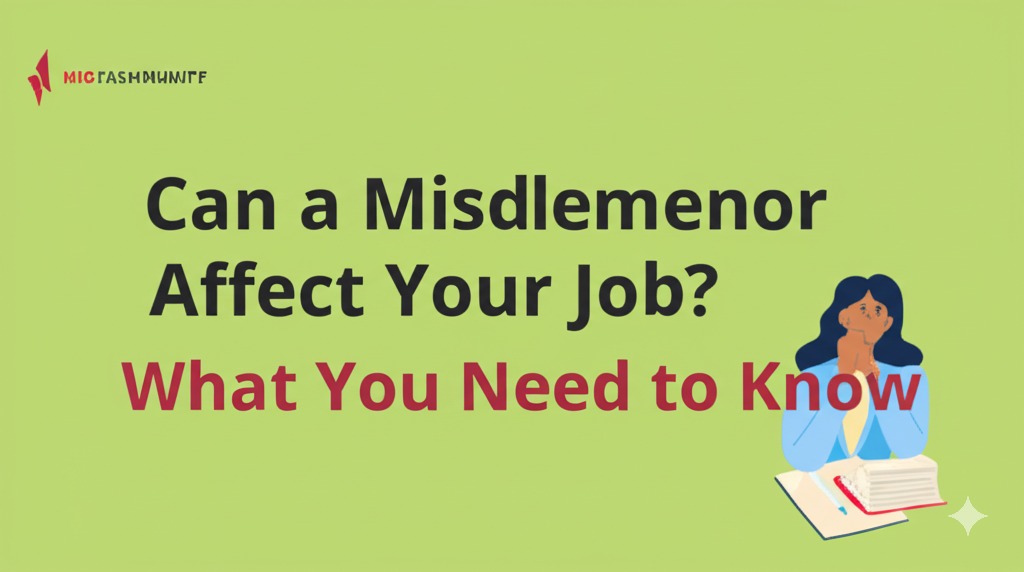
A mistake in your past—especially a misdemeanor—can feel like a shadow that follows you. But can a misdemeanor really affect your job or future employment opportunities? The short answer is: yes, it can—but not always. The impact of a misdemeanor depends on several factors, from the nature of the offense to the type of job you’re applying for.
In this article, we’ll explore how a misdemeanor can affect your career, when it matters most, and what you can do to move forward.
What Is a Misdemeanor?
A misdemeanor is a criminal offense that is generally considered less serious than a felony. However, it’s more serious than an infraction, such as a parking ticket. Common examples include:
- Shoplifting
- Driving under the influence (DUI)
- Simple assault
- Vandalism
- Disorderly conduct
Although these offenses are usually punishable by fines, probation, or jail time under one year, they still go on your criminal record—and that’s where the job-related consequences come into play.
Do Employers Check for Misdemeanors?
Background Checks Are Common
Most employers conduct background checks as part of the hiring process. These checks often include criminal history, which means misdemeanors can and often do show up. The extent of the check depends on the industry, the employer, and the position.
Industries that typically run extensive checks include:
- Healthcare
- Education
- Finance
- Government jobs
- Jobs involving children or vulnerable adults
What Employers See
During a background check, an employer might see:
- The type of offense
- The date of the conviction
- Whether it was a misdemeanor or felony
- Any sentence you received (e.g., probation, jail time)
While some employers may overlook older or minor misdemeanors, others may view them as red flags—especially if the offense is relevant to the job.
How a Misdemeanor Can Affect Your Current Job
Risk of Termination
If you’re already employed and your employer becomes aware of a misdemeanor—especially one that happened during your time at the company—you may be at risk of:
- Termination
- Suspension
- Demotion
Many companies have policies stating that any criminal activity must be reported. Failing to do so can be grounds for dismissal.
Impact on Professional Licenses
Certain professions require you to maintain a clean record. If you hold a license (e.g., teacher, nurse, accountant), a misdemeanor might:
- Trigger a review by a licensing board
- Lead to disciplinary action
- Result in revocation or suspension of your license
How a Misdemeanor Can Affect Future Job Opportunities
Job Applications and Criminal History
Many job applications include the question: “Have you ever been convicted of a crime?” If the misdemeanor hasn’t been sealed or expunged, you’ll have to answer truthfully. Lying on an application can cost you the job—even if the employer would have overlooked the offense.
Disqualification From Certain Roles
Certain jobs may automatically disqualify applicants with specific types of misdemeanors. For example:
- A DUI may disqualify you from a job that requires driving.
- A theft conviction might prevent you from working in finance or retail.
- A misdemeanor involving children could bar you from education-related roles.
Mitigating the Impact of a Misdemeanor
The good news? A misdemeanor doesn’t have to define your future. There are steps you can take to improve your job prospects and minimize its effect.
1. Be Honest and Proactive
If asked about your record, be upfront and provide context. Employers appreciate honesty. You might say:
“Yes, I made a mistake a few years ago, but I’ve taken full responsibility, completed all court requirements, and learned from the experience.”
2. Seek Expungement or Record Sealing
In many states, certain misdemeanors can be expunged or sealed, meaning they won’t show up in most background checks. Eligibility varies, but common requirements include:
- A waiting period (e.g., 1–5 years)
- No repeat offenses
- Completion of all sentencing terms
3. Highlight Positive Attributes
A misdemeanor is only one part of your story. Strengthen your resume and interviews by focusing on:
- Skills and achievements
- Volunteer work
- Character references
- Professional growth since the offense
4. Work With Employers Who Offer Second Chances
Some companies have “Ban the Box” policies, meaning they don’t ask about criminal history upfront. Others actively hire individuals with records. Look for employers who value:
- Rehabilitation
- Diversity
- Inclusion
Your Rights as a Job Seeker With a Misdemeanor
You still have rights and protections, even with a record.
- The Fair Credit Reporting Act (FCRA) requires employers to notify you if they take adverse action based on your background check.
- The Equal Employment Opportunity Commission (EEOC) discourages blanket policies against hiring individuals with records unless it’s job-related.
- Some states and cities have laws limiting how criminal records can be used in hiring decisions.
If you feel you’ve been unfairly denied employment due to a misdemeanor, you may be able to file a complaint or seek legal advice.
Final Thoughts: Don’t Let a Misdemeanor Define You
So, can a misdemeanor affect your job? Yes—but it’s not the end of the road. With the right approach, you can:
- Overcome the stigma
- Improve your chances of employment
- Show employers that you’ve grown from your mistakes
Everyone deserves a second chance. If you’re struggling with job opportunities due to a past misdemeanor, consider seeking legal guidance, talking to a career counselor, or connecting with reentry programs in your area.

Andre Cuevas provides career insights, job search strategies, and professional advice to help individuals navigate the job market and achieve their career goals.




